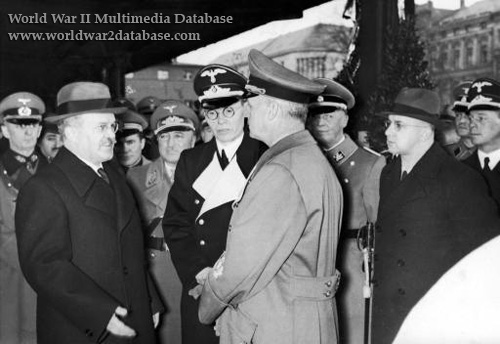| At Anhalter Bahnhof (“Station“) in Berlin, Soviet and German officials prepare to shake hands prior to departure. Foreground, left to right: Soviet People‘s Commissar for Foreign Affairs Vyacheslav Mikhailovich Molotov (March 9, 1890 – November 8, 1986); German Counselor of [Moscow] Legation Doctor Gustav Hilger (September 10, 1886 – July 27, 1965) German Minister of Foreign Affairs Joachim von Ribbentrop (April 30, 1893 – October 16, 1946) and Deutsche Arbeitsfront (“German Labor Front,“ or DAF) Doctor Robert Ley (February 15, 1890 – October 25, 1945). Molotov came to discuss the Soviet Union‘s entry into the Axis Pact. Unbeknownst to Molotov, Reichsklanzler (Reichchancellor) Adolf Hitler had already decided to invade the Soviet Union. However, Molotov met with Robbentrop and Hitler; Hilger, the assistant ambassador in Moscow, often translated. Hitler, Ribbentrop and Molotov tried to set Nazi German and Soviet spheres of influence; Hitler encouraged Molotov to look south to Iran and eventually India while preserving German access to Finland‘s resources, and to remove Soviet influence in the Balkans. Molotov remained firm, seeking to remove German troops from Finland and gain a warm water port in the Balkans. Ribbentrop and Molotov‘s last discussions were in an air raid shelter during a British nighttime attack on Berlin. Convinced that Germany was weakened by the British, and seeking to remain influential in Bulgaria and Yugoslavia, Molotov would not relent. Hitler had issued orders the day Molotov arrived in Berlin – November 12, 1940 – to the Wehrmacht to prepare for action against the Soviet Union, regardless of how negotiations proceeded. Ribbentrop was aware of Hitler‘s orders even as he met with Molotov. Still, Germany made a proposal for the Soviet Union to join the Axis on November 15, 1940. Stalin and Molotov, by then back in Moscow, made a counter-proposal on November 25, 1940 that included Soviet control of the Dardanelles, the entrance to the Black Sea. Molotov sought several times to gain German reaction to the proposal, but Ribbentrop, under orders from Hitler, never responded. Both Molotov and Ribeentrop came away from the meetings convinced their would be war between Germany and the Soviet Union soon. After the war, it became clear that Hitler had ordered an invasion, codenamed Operation Barbarossa, in July 1940. Ribbentrop and Ley were convicted of war crimes at Nuremberg. Ley committed suicide in prison and Ribbentrop was hanged. After testifying against Ribbentrop, Hilger became a consultant for the Central Intelligence Agency and the West German Gehlen Organization. | |
| Image Filename | wwii0243.jpg |
| Image Size | 86.73 KB |
| Image Dimensions | 500 x 344 |
| Photographer | Unknown |
| Photographer Title | |
| Caption Author | Jason McDonald |
| Date Photographed | November 01, 2004 |
| Location | Anhalter Station |
| City | Berlin |
| State or Province | Berlin |
| Country | Germany |
| Archive | |
| Record Number | |
| Status | Caption ©2009, ©2024 MFA Productions LLC Please Do Not Duplicate or Distribute Without Permission |

Author of the World War II Multimedia Database

